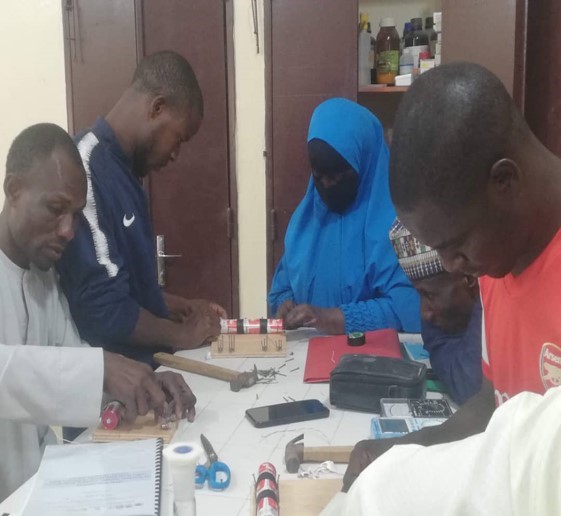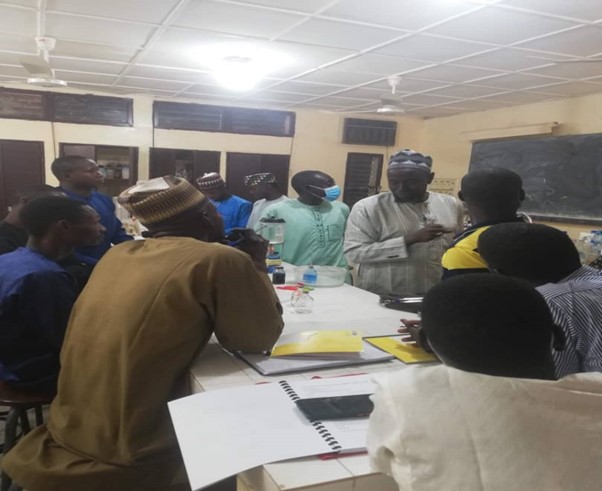In a concerted effort to bolster inclusive higher education in Africa, the Emerging Center for Teaching and Learning Mathematics and Science in sub-Saharan Africa (CEA MS4SSA) has joined forces with the United Nations High Commission for Refugees (UNHCR) to enhance the educational prospects of Nigerian refugees in the city of Diffa, Niger.
With funding support from the World Bank Group, French Development Agency, and governments of the 11 participating countries, and with implementation support from the Association of African Universities (AAU), the ACE Impact project, is designed to strengthen the capacities of participating universities to deliver high-quality training and research. ACE Impact aims to address specific regional development challenges, with CEA MS4SSA focusing on improving mathematics and science education in sub-Saharan Africa.
More specifically, the partnership between CEA MS4SSA and the UNHCR is a direct response to the long-standing challenge of extremely low refugee enrollment in higher education institutions in Africa. According to a UNHCR report published in 2023, only one out of 10 global refugees who have attained the university-going age range of between 18 and 24 years, get access to higher education. The report further attributes the worrying situation of refugees’ limited access to higher education partly to the general perennial problem of inadequate space in higher education institutions in Africa. Additionally, several inherent factors, including the lack of academic certification for admission into higher education institutions and the low numbers of graduating secondary school refugee students all impede refugees’ access to higher education. To tackle this challenge, the collaboration between CEA MS4SSA and UNHCR has initiated short-term vocational training programmes, as an alternative educational pathway of building the knowledge and skills of the teeming refugee population to become competitive in their quest to access higher education and in the rapidly evolving landscape of the 21st-century job market.
On its part under the partnership agreement, CEA MS4SSA trained and certified Nigerian refugee teachers in practical laboratory experiments in physics, chemistry, and life and earth sciences, covering the trainers’ living expenses.

The UNHCR, on the other hand, bore the transportation and accommodation costs of trainers outsourced from Niamey as well as provided training kits, among others, to facilitate the training sessions. These training sessions have equipped refugee teachers to deliver practical science education to secondary school students, enhancing their preparation for further studies and academic success.
The CEA MS4SSA and UNHCR partnership also set up examination centers close to refugee students living with their parents in the Diffa region to ensure they successfully take their end-of-year and other relevant examinations under acceptable conditions and enhance their chances of success. The training sessions, which encompassed the physical, life, and earth science areas, generally gave participants insights into how to set up and carry out practical experiments using conventional equipment, how to use digital and analogue measuring equipment and interpret the results of experiments, and how to design and make contextualized teaching materials from available local materials.

The immediate outcome of this thoughtful and timely intervention is evidenced in the record 73.29% pass rate the refugee students chalked in their Science Baccalaureate exam, which is equivalent to the Senior Secondary School Certificate Examination (SSCE) in the Nigerian educational system. By arming refugee students with valuable knowledge and skills, this initiative not only improves their prospects for higher education but also empowers them to contribute meaningfully to their communities. Looking ahead, expanding the scope of training programs and forging additional partnerships are essential for sustaining and scaling these efforts, ensuring greater integration of refugees into the African higher education landscape and reducing their susceptibility to joining extremist groups.
As the ACE Impact project approaches its conclusion in June 2025, CEA MS4SSA remains committed to exploring future opportunities for collaboration within the higher education sector. By continuing to promote educational inclusion and excellence, CEA MS4SSA aims to positively impact the lives of refugees and foster a brighter future for all.